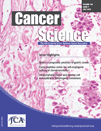Cancer Sci:内源性多效蛋白与前列腺癌细胞生长密切相关
2012-07-16 Beyond 生物谷
多效蛋白(PTN)是一种肝素结合生长因子,具有促进肿瘤生长、血管生成和转移等多种生物学功能。PTN似乎在前列腺癌细胞生长以及调控能影响前列腺癌细胞功能的其他刺激因子中有着特别的作用。然而,所有的研究迄今为止都是在体外进行的,基本上就是使用了不同类型的人前列腺癌细胞株来开展研究。 近日发表在Cancer Sci的一项研究论文着重研究了体内的内源性PTN对人前列腺癌细胞生长的作用。为此,科研人员将人
多效蛋白(PTN)是一种肝素结合生长因子,具有促进肿瘤生长、血管生成和转移等多种生物学功能。PTN似乎在前列腺癌细胞生长以及调控能影响前列腺癌细胞功能的其他刺激因子中有着特别的作用。然而,所有的研究迄今为止都是在体外进行的,基本上就是使用了不同类型的人前列腺癌细胞株来开展研究。
近日发表在Cancer Sci的一项研究论文着重研究了体内的内源性PTN对人前列腺癌细胞生长的作用。为此,科研人员将人前列腺癌PC-3细胞稳定转染有反义PTN序列的质粒载体,目的是为了抑制PC-3细胞株的PTN表达。
在体外测定PC-3的迁移、凋亡及对成骨细胞的黏附能力。皮下注入雄性NOD / SCID小鼠PC-3细胞,检测肿瘤的生长、老鼠存活率、血管新生、细胞凋亡和转移的数量。
体外实验数据显示PTN的缺失导致PC-3细胞的迁移能力下降,同时PC-3细胞凋亡增加,与成骨细胞的粘附能力降低。在前列腺癌NOD/ SCID小鼠移植瘤中,PTN的缺失显著抑制肿瘤的生长和血管生成,癌细胞凋亡增加。
此外,体内研究证实PTN的缺失导致肿瘤细胞的转移降低。总之研究数据表明在体内PTN与人前列腺癌细胞的生长密切相关,可作为前列腺癌新的治疗靶标。

doi:10.1111/j.1349-7006.2012.02383.x
PMC:
PMID:
Implication of pleiotrophin in human PC3 prostate cancer cell growth in vivo
Sotiria Tsirmoula1, Kostas Dimas2,3, Maria Hatziapostolou1, Margarita Lamprou1, Panagiota Ravazoula4, Evangelia Papadimitriou1,*
Pleiotrophin (PTN) is a heparin-binding growth factor with diverse functions related to tumor growth, angiogenesis and metastasis. PTN seems to have a significant role in prostate cancer cell growth and to mediate the stimulatory actions of other factors that affect prostate cancer cell functions. However, all studies performed up to date are in vitro, using different types of human prostate cancer cell lines. The aim of the present work was to study the role of endogenous PTN in human prostate cancer growth in vivo. For this purpose, human prostate cancer PC3 cells were stably transfected with a plasmid vector, bearing the antisense PTN sequence, in order to inhibit PTN expression (AS-PC3). Migration, apoptosis and adhesion on osteoblastic cells were measured in vitro. In vivo, PC3 cells were subcutaneously injected into male NOD/SCID mice, and tumor growth, survival rates, angiogenesis, apoptosis and the number of metastasis were estimated. PTN depletion resulted in a decreased migration capability of AS-PC3 cells compared with the corresponding mock-transfected or the non transfected PC3 cells, increased apoptosis and decreased adhesiveness to osteoblastic cells in vitro. In prostate cancer NOD/SCID mouse xenografts, PTN depletion significantly suppressed tumor growth and angiogenesis and induced apoptosis of cancer cells. In addition, PTN depletion decreased the number of metastases, providing a survival benefit for the animals bearing AS-PC3 xenografts. Our data suggest that PTN is implicated in human prostate cancer growth in vivo and may be considered as a potential target for the development of new therapeutic approaches for prostate cancer.
本网站所有内容来源注明为“梅斯医学”或“MedSci原创”的文字、图片和音视频资料,版权均属于梅斯医学所有。非经授权,任何媒体、网站或个人不得转载,授权转载时须注明来源为“梅斯医学”。其它来源的文章系转载文章,或“梅斯号”自媒体发布的文章,仅系出于传递更多信息之目的,本站仅负责审核内容合规,其内容不代表本站立场,本站不负责内容的准确性和版权。如果存在侵权、或不希望被转载的媒体或个人可与我们联系,我们将立即进行删除处理。
在此留言








#内源性#
79
#癌细胞#
41
#细胞生长#
73
#前列腺癌细胞#
63